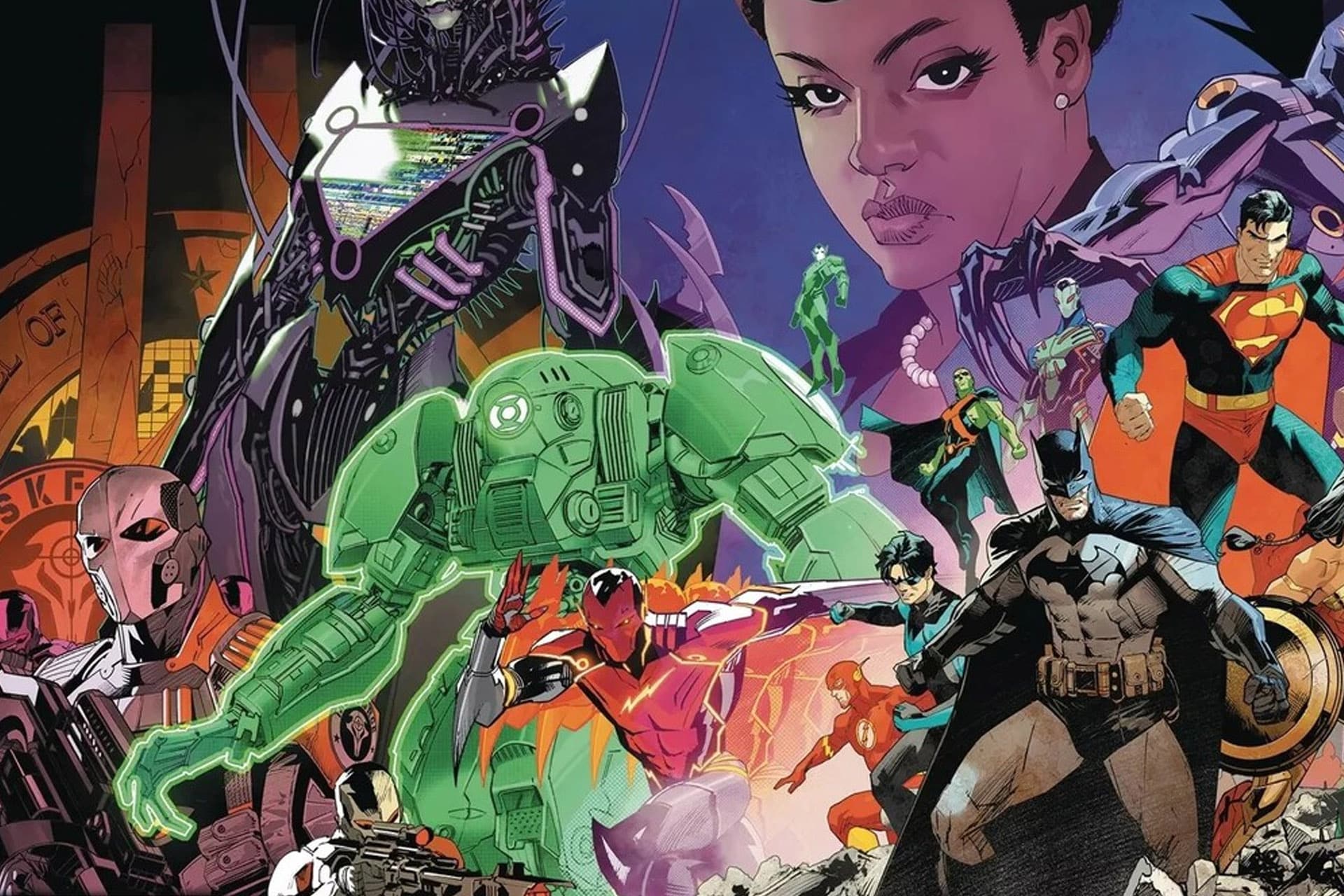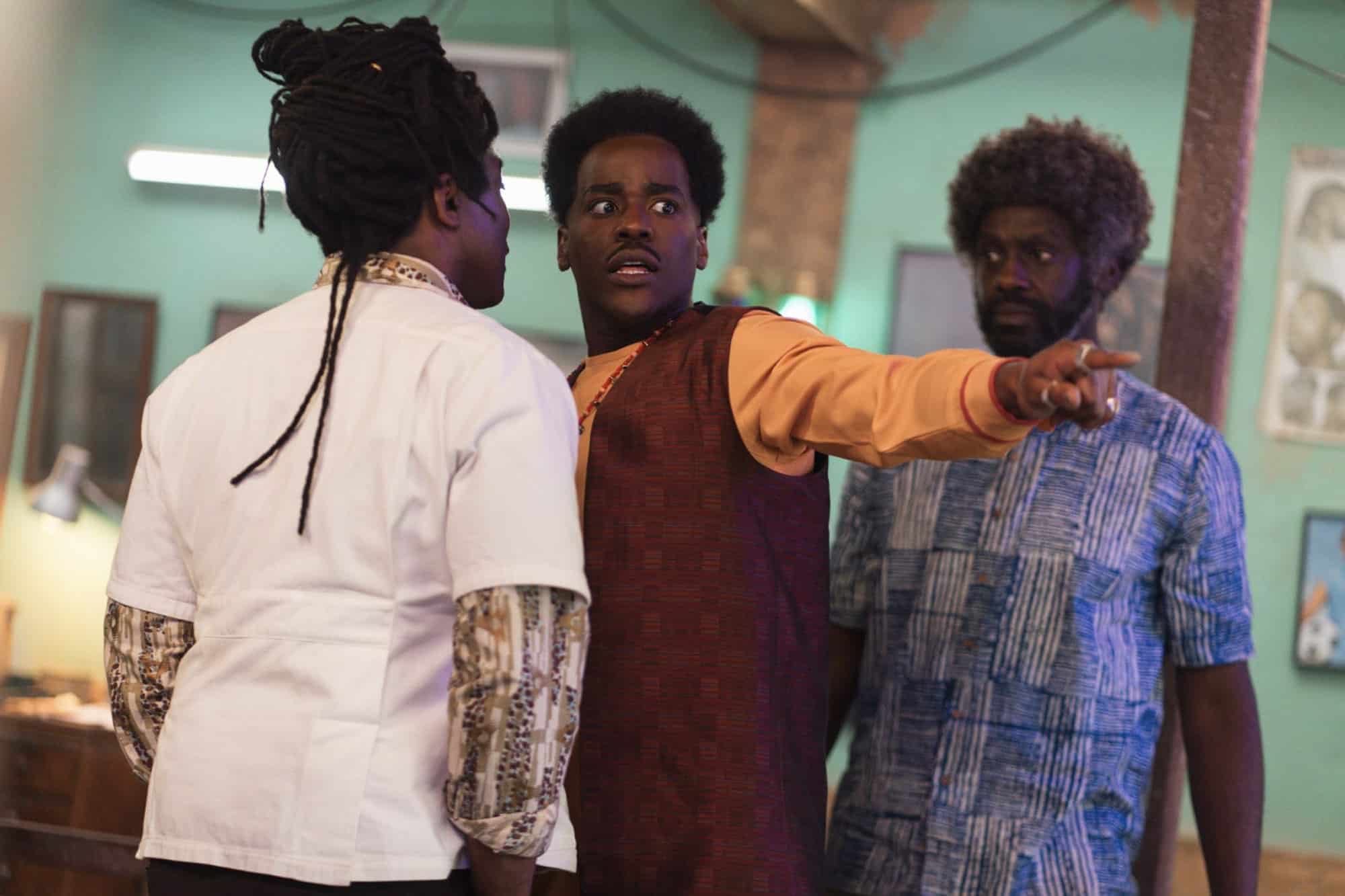- Series: 10
- Episode: Eleven
- Duration: 45 minutes
- Writer: Steven Moffat
- Director: Rachel Talalay
It’s like watching plants grow
As if. World Enough and Time shouts ‘finale’ from its opening second, and quickly sets out a vast stall. But it’s all a ruse. All of it. There’s the ‘test’ that took a central role in the episode’s trailer and concludes the series’ ‘vault’ arc. There’s the looming black hole at the head of the ship, and before that the sci-fi scope framed through the sweep of a huge ship. It’s all a little 1970s eco-scifi, but it’s also something new. “Brand new,” as the Eleventh Doctor might say. This finale is firmly fixed in one location, but the largest single location that any series-closer have served up.
And that’s after the title sequence. Before that, probably one of the most literal teasers in Doctor Who’s history. A sweep across the snow, why do we think of Christmas, The Tenth Planet, and a haggared regenerating Doctor. Surely the Twelfth Doctor’s death, in a ragged jacket, apparently much older , won’t hand him the same last words as the First Doctor? It’s all a big tease, isn’t it? But what a ruse.
World Enough and Time manages to be many things at once, and far from some previous peak episodes or finales, it really can’t pack enough in. True to its time-stretching conceit, it’s both quick and slow. It’s packed with laugh-out-loud moments (possibly unrivalled in that) and it’s also proper, gob-smacking. The two main villainous surprises have been signalled from the first episode of the series or before and yet, it manages to pull the rug. In short, it’s brilliant, almost as damn near as possible to get to that imposible thing: perfect Doctor Who.

Defying expectations
Yeah, well don’t test me while eating crisps
Steven Moffat’s often laid out the rather beligerant views that dictated the show’s direction under his seven year watch. For instance, it’s a show about time so make it about time. Continuity takes a second seat to the story. Drama dictates all. Some of his stories have worked against that, in some kind of paradoxical cycle no doubt, but Moffat’s Who was always awkward. And here it reaches its true fulfillment. World Enough and Time taps the fourth wall as much as it calls on on the show’s 53 year history. It constantly defies expectation in ways Moffat’s not always been able to muster. And after the slump of two miserable Christmas specials and an ambitious but hugely flawed mid-series three-parter the success of this episode was scarcely worth considering.
The banter of the opening, as Missy mercilessly lampoons her frenemy and his “things/assistants/snacks” while immediately reclaiming the pizazz she’s missed throughout the series (good = dull, right?), nips and weaves but also ties perfectly into the episode’s second shock. Yes, within five minutes, both the Doctor and Bill are dead.

Exposition central
It’s a matter of time
Sense is a little irrelevant here, such is the gusto of the high concept. But astonishingly, it actually hangs together better on repeat viewings. It helps having knowledge that there are rival Time lords pulling the strings at either end of course, but that’s fairly unusual for a Moffat story.
“Okay you two, welcome to a new timezone”
The creeping surgical victims who ‘rescue’ Bill smacks a little of the “come up with visual first” schtik that’s been levelled at Moffat in the past (astronaut in a lake anyone?). But slips can be ignored in the story’s sharp vision — it’s more important that the show hangs on its own logic of a hard science-fiction premise. The alien janitor is there simply to present the “they only take humans” clue and dispatch Bill at the last possible moment (still, the Doctor’s “unprovoked’ Venusian akido seems unnecessary — “sorry, pressed for time”). If anything really sticks it’s the motivation for voyaging between the upper and lower levels. The idea of immediate descendants is a compelling one, but only from the perspective of the bridge. the life signs should be blipping all over the place, and from the perspective of the lower floors, any scouting party could have easily made the trip back up, returning in mere seconds with little hint of what would block them. Just as Bill’s rescuers are happy to do.
If it wasn’t for the laboured points made by Bill’s some time rescuer Mr Razor, it would be a huge issue. It depends on superstition as much as Bill needs the compelling constraint of her hospital-dependent heart to stay below decks for years, even beyond the Doctor’s telepathic impression.
Still, the temporal exposition that kicks in at 17 minutes, along with the two-time stream story gives little indication of how compelling the story will become.

Mondasian heritage
Curing them
The concept of Mondasian Cybermen is believably a a thank you to Peter Capaldi, but it’s not token. He really knew what he was doing with this request. On their one previous appearance five decades ago, these gangly Cybermen cut memorable figures. Human hands, expressionless faces, a clunky proto-gait and way of talking. Now we know they work out of the snow blizzards of the south pole. While their return can’t mean much to new fans — it’s strange that the planet’s dislocation from the sun and its twin isn’t referenced — it’s not un-canonical.
Cyber history is dependent on breakaways and separate factions considering their fast evolution and, oh yes, the destruction of their planet and power source in their original 1966 appearance.
Marc Platt’s Spare Parts, produced for Big Finish’s expanded universe, has long been held-up as a definitive Genesis of the Cybermen story and that classic tale is is paid service here. Part of a canonical universe since 2013’s The Night of the Doctor, it remains unaffected by World Enough and Time, although the heightened technological mash-up here is inelegant.
While Mondasian’s are canonically considered to be more advanced than humans pre-conversion, here the planet is presented as remarkably advanced. Not only with incredible space-faring technology that seems to beat the point of their cousins later turning their planet into a ship, but also one familiar with alien species, and employing them as junior crew-members, despite being barely out of the solar system (or so a screen we see suggests). Science-fiction power sources may explain away the mixed habitats on the ship, but does little for the smog filled “New Mondas” city at the base of the ship. Although we only have Mr Razor’s word for it, these Mondasian descendants seem well aware they’re on a ship.
One great shame is that the view of the planet fails to show Mondas as a reverse-Earth as The Tenth Planet did. That was enjoyable hokum and it wouldn’t have stuck out here. On the relatively unexplored Mondasian Cybermen though, Moffat does take the chance to weave in some additional myth. The infamous handle bars are designed to limit the pain, the famous lilting voice initially on external vocal pads. Extraordinary the Doctor doesn’t recognise that modulation…

Genesis of the Cybermen
In fact, do you know what I’d call it? I’d call it a genesis
Once below decks, Moffat ramps up the horror of Cyber-conversion. The pain interlude is a horrible, drawn out sequence, but necessary. While Neil Gaiman’s Nightmare in Silver (Series Seven) set out to make the Cybermen scary again, Moffat heads back to their roots, back when the cure was far clearly worse than the disease. Not only does he have far greater success, but also fits in some zinging lines that befit this tale’s genesis status. We have, after all, been waiting for this story for five decades. Int he bowels of the aging ship, “our world is rust, our air is engine fumes, so we must evolve to survive. But evolution is not fast enough.”
As awkward as some of it may be, Moffat also manages to open up another stem of Mondasian history. While Cybermen have previously suffered under his watch, World Enough and Time makes clear the strength of Cyber-history that the show can and should draw on. Mr Razor’s ominous talk of danger above and the “expedition to floor 507, the largest of the solar farms,” that led to “silence” will surely be picked up in next week’s finale. A ship in different time zones and the fast evolution of the Cyber-race were concepts made for each other.
There is something up there and we must be strong
It’s almost a shame that two-parter promises to pull in the Cyber equivalents of Genesis of the Daleks and Asylum of the Daleks considering the strong and untapped horror at its heart.
and what’s particularly gratifying is the homogeneous origins of these Cybermen. There’s no Davros-type figure guiding this genesis. If there is, it’s the Master, who’s plan is the true focus. The lead surgeon, the skill and practises of the hospital are simply presented and abandoned for the greater Cyber-good.

Keeping tone
Bill, she’s just trying to wind you up
After Rona Munro’s sublime shifts oftome last week, purposefully making time for quieter moments in the companion’s journey, Moffat also ups his game. In the depth of shocking horror, Bill lifeless fall with a hole the size of her head in her chest, the ‘idiot’-‘shut up’-filled scene on top of the university isn’t just beautifully poignant, but one of the greatest companion-Doctor moments in the show’s history. That sublime moment ends with a promise — and what a promise: “promise me you won’t get me killed”. It really hits home, as Rachel Talalay returns to produce her best work for the show yet. Talalay’s draws out space melodrama as much as survival horror as she heightens an episode that already promised so much.
And much of the emotion is carried through Peal Mackie’s Bill Potts. An extraordinary performance, tapping places few companions have been able to. There’s a great deal of comedy to mix in with the heart-tugging. Take when she stares out across New Mondas, scared into retreat by the piled association of horrors and threats (“How much longer, Doctor? How many more years?”)

Layering
He was too busy burning them — I don’t think she saw anything
Add onto all of this the beauty of layering — Over a decade or so we watch Bill and Mr Razor studying stills of the Doctor on a silent black and white (“The months will fly by”). It’s incredible how many ways World Enough and Time finds to reference the show’s early years. As part of that, the show’s finally ready to play with the Master’s history after all but cocking a snook at the ’80s incarnation in Series Nine.
“A week raising his eyebrow, why would I change?”
A special word for John Simm, who exceeds his previous appearances despite having his cameo ridiculously spoiled as far back as episode one. And that wasn’t in the episode’s continuity, but the promotional trailer. Even with Murray Gold’s swirling Master Tape music, his combination of laugh out loud delivery, excellent make-up and the show’s pace kept the wool over my eyes. Who’d have thought — a Masterly disguise that actually works? And ten years on from his introduction, the Saxon Master proves that he truly is the one of the character’s most perfidious incarnations. A truly dastardly plan this. 10 years in character, spending considerably longer with Bill than the Doctor, to do little less than ensure that he hurts the Doctor and push his future self back to evil. And one of the few times that disguise is utterly required — “When you happen to be someone’s former Prime Minister” (cue classic eighties schlock zoom on the Master’s face).

Biblical
The pain will be cured and the exodus will begin
Missy might disrupt the concept at the end, but Exodus is the natural progression from this prolonged Genesis. We see the enhanced Mondasians, apparently stronger in all but name and their uncertain future guiding the humans, despite their apparently frailer forms and drips. We know what it the future is, but can the Mondasians? That it’s happening out of time and place only hints at the inevitability of the Cyber race.
Hello, ordinary person
Under deck, razor and Bill’s relationship is as affecting as it is amusing, capturing a palpable sense of endearment that makes Razor’s betrayal all the more painful. The joy when Bill finds the TARDIS crew have turned to the lift is emotive, the “You are my dearest person” speech hilarious, and all the more because of the horror it sets up.
“Do not do this. When you hug me, it hurts my heart” Your chest unit, it digs right in” — this episode takes ridiculous amounts of time for lines like that and it’ hard to begrudge it. Aside from the music, the hints were all there (“You see through my clever disguise”) I was so trolled and it feels great.
As it ends on a tear-drop, the signs are of the Cyber-future to come. “I waited” is the mournful quote that runs with the spectacular cliff-hanger. Almost capturing the pain we have waiting for the conclusion.
Stunning moment
“You’ve met the ex”
Oh let’s hand it to him. I’m thrilled to report that I was entirely sucked into the Master’s disguise, realising seconds before Missy. I’m not alone, thank the vortex. John Simm can now be considered a truly blinding Who addition. And to think that out of character, away from the broad tenth Doctor-baiting gurning he could own such brilliantly funny lines and mannerisms.
Everyday hook of the week
Enjoying your bacon sandwich? Because it had a mummy and a daddy
This is all about consumption. Fear consumes the janitor on the ship that the black hole’s desperate to consume. The Mondasians are consumed by their technology and fear of the future. The Doctor has one of his greatest hearts to heart and dodges a promise while stuffing his face. This is full pelt Doctor Who consuming itself, and it’s glorious.
Doctor look of the week
My name is Doctor Who
“Me” — when Bill admits that she’s human, the Doctor knows it’s all over. “you know what Doctor, I said this was a bad idea”.
It’s matched by his mirror look at the end of the episode. On the lowest level, in the conversion room, a door swings open to reveal some boots. The Doctor again cautious, has a look that says it all.
Production touch of the week
We are dying, all of us on this ship dying
There’s much to admire and adore in this episode from the long pans across the ship to the moment the TARDIS lands perfectly on the immaculately small bridge to pretty much everything else. Let’s hand this most difficult of gongs to the representation of New Mondas on the lowest deck. Dominated by the floor sign, it still manages to capture much imagined about the latter days of Mondas, the conversion ‘victims’puncturing its dank, drab streets like needle pricks. At last we’ve seen Mondas, or likely come the closest we ever will.
A Jokerside View
No, this is worse than I thought, much worse
It looks a lot like The Maze Runner, where Micky and Martha have given up on sontarans and instead run around a giant maze, equally pursuing and being chased by a converted Danny Pink and Bill Potts. Just to add some extra sexual tension, commentary provided added by Oswin the Dalek from the centre of the maze.
Vault action
Hello Missy, I’m the Master. I’m very worried about my future
that’s a killer line, and perhaps this episode is all vault action. it’s the culmination and the end, some might say just results for the Doctor attempting to alter the Master/Missy. Was there ever any doubt this could go horribly wrong? “She’s the only person I’ve ever met who’s even remotely like me”
Verdict
To survive, they are what we all must become
Any comparison with the show itself, on the cusp of a wholesale change, falls apart on the fact that not every episode can be this good.
World Enough and Time isn’t perfect. It’s just astoundingly, gob-smackingly, blindingly good Doctor Who. Heart-wrenching, sci-fi fuelled, surprising, laugh-out-loud funny, obsessed with its past and just bloody unmissable. It harks back to some of Moffat’s epic best scripts, the like of Time of the Angels, while rejecting the fairytale, tangled romanticism of his worst.
This one will stay in the memory, we can only hope with every stream of regenerative juice that next week’s finale can match it.
Review previously published on Medium (July 2, 2017)









0 Comments